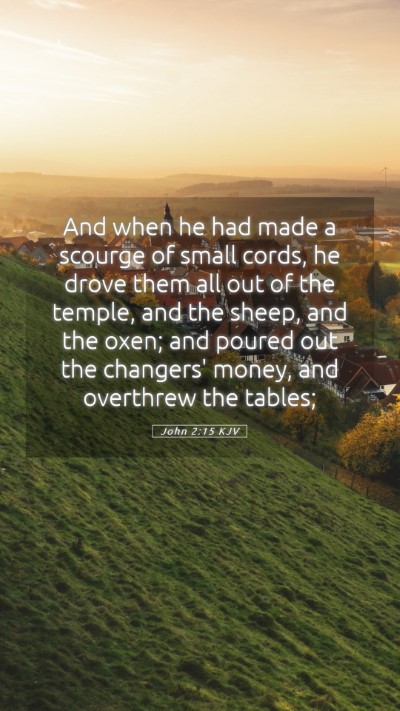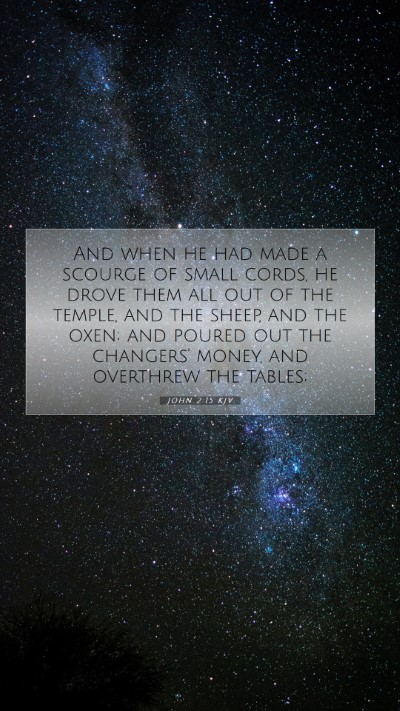Old Testament
Genesis Exodus Leviticus Numbers Deuteronomy Joshua Judges Ruth 1 Samuel 2 Samuel 1 Kings 2 Kings 1 Chronicles 2 Chronicles Ezra Nehemiah Esther Job Psalms Proverbs Ecclesiastes Song of Solomon Isaiah Jeremiah Lamentations Ezekiel Daniel Hosea Joel Amos Obadiah Jonah Micah Nahum Habakkuk Zephaniah Haggai Zechariah MalachiJohn 2:15 Meaning
What is the meaning of John 2:15?
And when he had made a scourge of small cords, he drove them all out of the temple, and the sheep, and the oxen; and poured out the changers' money, and overthrew the tables;
John 2:15 Bible Verse Meaning
Understanding the Meaning of John 2:15
John 2:15 (KJV): "And when he had made a scourge of small cords, he drove them all out of the temple, and the sheep, and the oxen; and poured out the changers' money, and overthrew the tables."
Overview
The verse John 2:15 depicts a significant moment in the ministry of Jesus where he cleanses the temple. This act is often viewed not just as a physical act of cleansing but as a profound statement about the sanctity and purpose of the temple and worship. Here, we will explore various interpretations and insights derived from public domain commentaries including those from Matthew Henry, Albert Barnes, and Adam Clarke.
Insights from Public Domain Commentaries
Matthew Henry's Commentary
Contextual Significance: Matthew Henry emphasizes the context of this event, situating it during the Passover when many Jews would gather in Jerusalem. The temple, meant to be a house of prayer, had become a marketplace. Henry highlights that Jesus' actions were a fulfillment of prophecy, pointing to the corruption that can occur within religious practices.
Moral Implications: He remarks that Jesus demonstrated a righteous indignation towards the misuse of the temple. The driving out of merchants illustrates the need for reverence in places dedicated to worship. Henry's analysis suggests that this act serves as a metaphor for the purification required in the hearts of believers.
Albert Barnes' Notes
Historical Context: Albert Barnes provides insight into the historical practices occurring within the temple. He notes that the traders were selling animals for sacrifice, which was necessary for the influx of visitors during Passover, yet their methods were commercialized and corrupt. Barnes underlines the dissonance between genuine worship and the profit-driven motives that had infiltrated the sacred space.
Symbolic Meaning: Barnes points out that the scourge Jesus made represents the need to remove impure influences from our lives. This act of cleansing underscores a lesson that Jesus emphasizes throughout his ministry: the importance of true devotion over hollow ritualism.
Adam Clarke's Commentary
Analysis of the Scourge: Adam Clarke elaborates on the significance of the scourge, interpreting it as an instrument of purification rather than one of malice. He suggests that Jesus, often perceived as compassionate, here displays a side of divine authority that calls for justice in worship.
Theological Reflection: Clarke comments on the theological implications of Christ's actions, viewing it as a precursor to the ultimate sacrifice He would one day offer. He argues that this moment foreshadows the need for a new covenant wherein worship would be transformed by grace rather than mere adherence to law.
Theological Themes
- Sanctity of Worship: The cleansing of the temple signifies the need for holiness in worship practices.
- Righteous Indignation: Jesus' reaction teaches about the importance of zeal for God's house.
- Transformation of Worship: Christ represents the transition from old covenant provisions to new covenant grace.
- Judgment and Mercy: The dual demonstration of judgment (against corruption) and mercy (inviting genuine worship) provides a holistic view of Jesus' mission.
Application in Daily Life
The events of John 2:15 call for reflection on our personal worship practices. It invites questions about:
- Are there distractions in our worship that need to be cleared away?
- How can we ensure our spiritual practices are aligned with a heart of sincerity?
- What does it mean to treat our bodies as temples of the Holy Spirit?
Related Bible Verses
- Matthew 21:12-13: Jesus cleanses the temple again, reinforcing His authority over sacred spaces.
- Isaiah 56:7: A call for God's house to be a house of prayer for all nations.
- 1 Corinthians 6:19: Paul reminds believers that their bodies are temples of the Holy Spirit.
- John 4:24: Worship must be in spirit and truth, emphasizing authenticity over ritual.
Conclusion
John 2:15 illustrates the zeal of Jesus for the purity of worship in the temple, which can be applied to our lives today. The need for sincere worship free from commercialism or ritualistic emptiness resonates throughout Scripture. Understanding and applying the meanings derived from this verse fosters deeper Bible study insights and assists in navigating the complexities of faith and worship.


